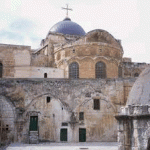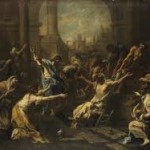Easter Sunday – Cycle A
Reflecting on John 20:1-9
There is, in the city of Jerusalem, a most peaceful garden. It has a water cistern that dates back to the time of Christ, and in fact a first-century tomb is there too. This “garden tomb” is close to a rock quarry, with a particular rock that resembles a skull. This quarry would have been “just outside the city gates” in Jesus’ day. Might it have been “the skull place”—Golgotha—where Jesus was crucified, and might the garden “nearby” have been the very one that was offered by Joseph of Arimathea as the burial place for Jesus?
It’s so peaceful to pray there. The flowers are always in bloom. The birds sing. It’s exactly how you’ve pictured it all your life. You want so badly for this to be the place.
But of course it’s not the place. The actual site of the empty tomb is the huge, cavernous, ancient Church of the Holy Sepulchre. Constantine’s mother St. Helena built this iconic memorial over the very rock of Golgotha and the very ground in which Jesus was buried, and from which he rose.
Today, millions of people swarm in and around the church every day of the year. It’s loud, and it’s dirty, and it’s so, so old. And it’s exactly the place. They have taken the Lord from the tomb, and we don’t know where they’ve put him. We want him to be in the quiet, lovely garden. But he is, always, just where we are. He is risen, and he is with us, in the ages, in the suffering, in the clamor. The tomb is empty, because he lives now with us. ALLELUIA.
Do you have a special place where you sense the risen Lord?
What would YOU like to say about this question, or today’s readings, or any of the columns from the past year? The sacred conversations are setting a Pentecost fire! Register here today and join the conversation.
I have come to light a fire on the earth; how I wish it were already burning (Lk.12:49).




